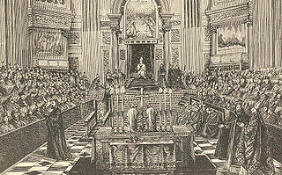
A Hstory Of The Councils Of The Church Volumes 1 to 5 by Charles Joseph Hefele D.D.
AUTHOR’S PREFACE
A MERE glance at the number of pages in this new edition (800 instead of 732) will show that it may be properly called an enlarged edition of this portion of the History of the Councils. Whether I am justified also in designating it as an improved edition, my respected readers will be in a position to judge after they have examined sections 284, 285, 289, 290, 296, 298, 314, 324, 360, 362, 366, 367, 368, 370, 374, 375, 378, 383, 384, 399, and 406–408. Several ancient councils not previously known have now been inserted in their proper place, many new investigations have been made use of, many earlier mistakes and defects have been rectified. The most important alterations are introduced into the sections which refer to Boniface, the apostle of the Germans, and to Pope Honorius I. Occasion for the former was given by the recent investigations of H. Hahn, Dünzelmann, Oelsner, Alberdingk-Thijm, and others. With regard to the modifications made in reference to Pope Honorius, I have thought it fair to distinguish clearly every departure of the second edition from the first, which was in any way important. Even in the first edition, as well as in the Latin memorial [prepared for the Vatican Council], Causa Honorii Papæ, I laid down as my conclusion: That Honorius thought in an orthodox sense, but unhappily, especially in his first letter to the Patriarch Sergius of Constantinople, he had expressed himself in a Monothelite manner. This position I still hold firmly; but I have also given repeated fresh consideration to the subject, and have weighed what others have more recently written; so that I have now modified or entirely abandoned many details of my earlier statements; and, especially with regard to the first letter of Honorius, I now form a more favourable judgment than before.
It remains incontestable that Honorius himself made use of the Monothelite expression una voluntas (in Christ), and that he disapproved the shibboleth of orthodoxy, δύο ἐνέργειαι (duæ operationes), but he did both under a misunderstanding, since, at the beginning of the great dogmatic conflict, he had not clearly enough comprehended the two terms. That, in spite of the unhappy, heretically sounding expression, he thought in an orthodox sense, as already remarked, I maintained before; but I must now add that, in several passages of both his letters, he did not endeavour to express the orthodox thought.
When, for example, in his first letter, he ascribes to Christ the Lex Mentis, he, in accordance with the Pauline manner of speech (Rom. 7:23), which he followed, meant nothing else than the incorrupt human will of Christ, so that eo ispo he maintained two wills in Christ—this human will and also the divine.
If, nevertheless, Honorius would allow only unam voluntatem in Christ, he understood by this the moral unity of the incorrupt human will with the divine will in Christ. No less do we find, even in the first letter of Honorius, indications that he himself assumed two energies or operationes in Christ (see below, p. 40); but he expresses himself much better on the subject in his second letter, when he writes: “The divine nature in Christ works that which is divine, and the human nature accomplishes that which is of the flesh,” i.e., there are two energies or operationes to be distinguished in Christ. As, however, Hororius himself made use of the Monothelite expression una voluntas, and disapproved of the orthodox δύο ἐνέργειαι, he seemed to support Monothelitism, and thereby actually helped to promote the heresy.
As in the first edition, so also now I hold firmly that neither the letters of Honorius nor the Acts of the sixth Œcumenical Council, which condemned him, have been falsified; but also, notwithstanding the objections of the Roman Professor Pennacchi (see sec. 324), for whom personally I have a great respect, I still maintain the Œcumenical character of those sessions which pronounced anathema on Honorius; and I come to the conclusion, that the Council kept to the mere words of the letters of Honorius which they had before them, to the fact that he himself made use of the heretical term and disapproved of the orthodox phrase, and on this ground pronounced his sentence. In earlier times, tribunals generally troubled themselves much more with the mere facts than with psychological considerations. Moreover, it did not escape the sixth Œcumenical Council, that some passages in the letters of Honorius were in contradiction to his apparent Monothelitism (see sec. 324). With greater accuracy than the Council, Pope Leo II. pointed out the fault of Honorius, showing that, instead of checking the heresy at its very beginning by a clear statement of the orthodox doctrine, he helped to promote it by negligentia (cf. sec. 324).
Copyright ©1999-2023 Wildfire Fellowship, Inc all rights reserved

 Keep Site Running
Keep Site Running